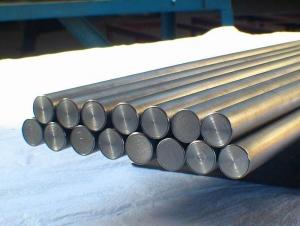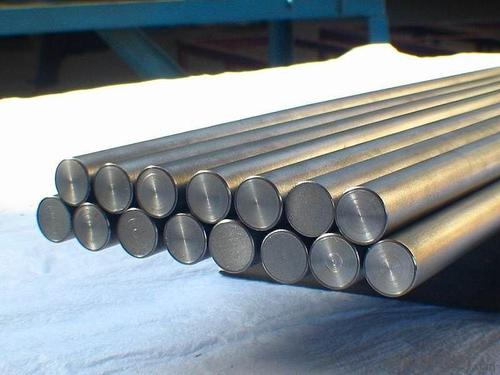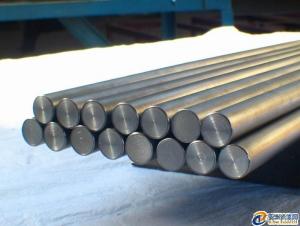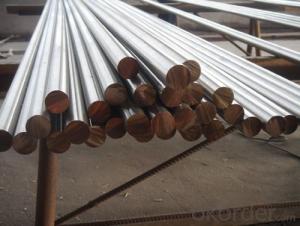Steel Round Bar 5-28mm Hot Rolled GB Q235 Q195
- Loading Port:
- China main port
- Payment Terms:
- TT OR LC
- Min Order Qty:
- 50 m.t.
- Supply Capability:
- 10000 m.t./month
OKorder Service Pledge
OKorder Financial Service
You Might Also Like
Specification
High Quality Round Bar 5-28mm Hot Rolled GB Q235 Q195
Product Applications:
1) Suitable for making various strong cutting tool abrasion resistance, impact resistance.
2) Used to produce all kinds of high hard and super hard saw blade, drill, tap, broach, gear hob and various kinds of milling cutter.
3) Used for advanced punching die, screw die, and the toughness and complicated shape of the punch, etc.
4) Is used for cold forging die and drawing mode, etc.
5) Recommended watchcase factory, screw factory and other cold stamping products industry use.
Product Advantages:
OKorder's High Quality Round Bar 5-28mm Hot Rolled GB Q235 Q195are durable, strong, and resist corrosion.
Main Product Features:
· Premium quality
· Prompt delivery & seaworthy packing (30 days after receiving deposit)
· Corrosion resistance
· Can be recycled and reused
· Mill test certification
· Professional Service
· Competitive pricing
Product Specifications:
1. Grade: GB, JIS, ASTM, EN
2. Grade: Q235, SS400, A36, S235JR
3. Diameter and mass: As below
Diameter | Mass | Diameter | Mass | Diameter | Mass |
(mm) | (kg/m) | (mm) | (kg/m) | (mm) | (kg/m) |
6 | 0.22 | 22 | 2.98 | 53 | 17.30 |
7 | 0.30 | 24 | 3.55 | 56 | 19.30 |
8 | 0.40 | 25 | 3.85 | 60 | 22.20 |
9 | 0.50 | 26 | 4.17 | 63 | 24.50 |
10 | 0.62 | 28 | 4.83 | 65 | 26.00 |
11 | 0.75 | 30 | 5.55 | 70 | 30.20 |
12 | 0.89 | 32 | 6.31 | 75 | 34.70 |
13 | 1.04 | 34 | 7.13 | 80 | 39.50 |
14 | 1.21 | 36 | 7.99 | 85 | 44.50 |
15 | 1.39 | 38 | 8.90 | 90 | 49.90 |
16 | 1.58 | 40 | 9.86 | 95 | 55.60 |
17 | 1.78 | 42 | 10.90 | 100 | 61.70 |
18 | 2.00 | 45 | 12.50 | 120 | 88.85 |
19 | 2.23 | 48 | 14.20 | 140 | 120.93 |
20 | 2.47 | 50 | 15.40 | 150 | 138.82 |
4. Material: Mild Steel
5. Heat treatment of high quality steel:
Fire: Isothermal annealing temperature is 800 ~ 880 °C, with 10 ~ 20 °C, the furnace cooling to about 600 °C, hardness above HB269.
Preheat temperature: 730-730 °C
Quenching temperature: 1190-1210 °C
Tempering temperature: 540-595 °C
Cold drawn, hardness 285 HBS
Cold drawn after annealing condition, hardness 277 HBS
Quenching methods: oil quenching, air cooling or salt bath quenching
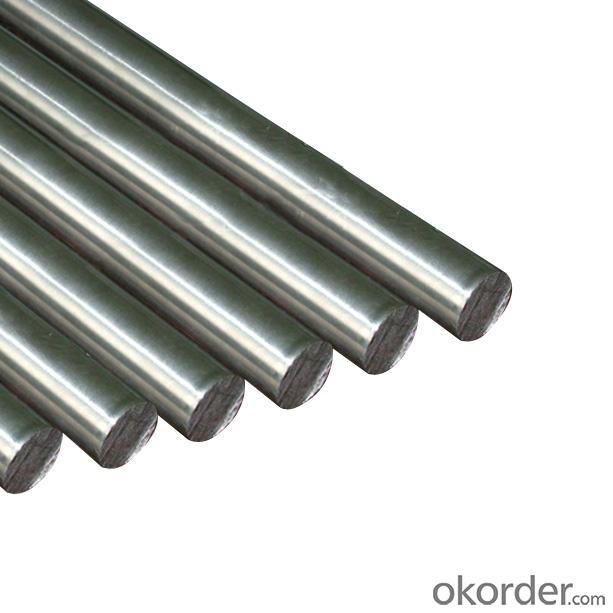
- Q: What is the Young's modulus of a steel round bar?
- A steel round bar's Young's modulus is a measure of its stiffness or elasticity, determining how much it deforms under a given load. This material property is defined as the ratio of stress to strain. The Young's modulus for steel usually falls within the range of 190 to 210 gigapascals (GPa). This implies that the strain experienced by the bar is approximately 190 to 210 times greater than the stress applied. The Young's modulus of a specific steel round bar may differ due to various factors like the grade of steel, composition, and any heat treatment it has undergone. Hence, it is crucial to refer to relevant material specifications or conduct specific testing to establish the precise Young's modulus for a particular steel round bar.
- Q: What are the common finishes for steel round bars?
- There are several common finishes for steel round bars, each offering unique properties and aesthetic appeal. Some of the most common finishes include: 1. Hot Rolled: This finish is achieved by rolling the steel at a high temperature, which creates a rough and scaled surface. It is commonly used for applications where a rough texture is desired, such as structural components or machinery. 2. Cold Rolled: This finish is achieved by rolling the steel at room temperature, resulting in a smoother and more polished surface. It is often used in applications where a clean and precise appearance is required, such as in the automotive or aerospace industries. 3. Turned and Polished: This finish involves machining the steel round bar to achieve a smooth and polished surface. It is typically used for decorative purposes or in applications where a high level of precision is required, such as in the manufacture of shafts or fasteners. 4. Ground: This finish involves grinding the steel round bar to remove any surface imperfections or irregularities. It results in a smooth and uniform surface, making it suitable for applications where tight tolerances or a consistent finish are essential. 5. Coated or Plated: Steel round bars can also be finished with various coatings or platings to enhance their corrosion resistance or aesthetic appeal. Common options include galvanizing, which involves applying a layer of zinc to protect against rust, or chrome plating, which provides a shiny and attractive finish. Ultimately, the choice of finish for a steel round bar depends on the specific requirements of the application, such as the desired appearance, corrosion resistance, or mechanical properties needed.
- Q: How are steel round bars used in the construction of railways?
- The durability and strength of steel round bars make them a common choice for constructing railways. These bars are typically made of high-quality steel, which allows them to resist wear and tear caused by heavy loads and constant use. In the construction of railways, steel round bars are primarily used to reinforce the concrete sleepers or ties that support the tracks. They are often installed as reinforcement rods within these sleepers, providing extra strength and stability to enhance the overall structural integrity of the railway system. Steel round bars are also utilized in the construction of railway bridges and tunnels. They are used to reinforce the concrete structures, ensuring that they can withstand the weight of passing trains and other loads. Moreover, steel round bars are employed in the fabrication of various railway components, including rail fastenings, switch points, and signaling equipment. These bars are shaped and sized to meet the specific requirements of these components. The high strength and flexibility of steel round bars make them ideal for these applications, as they can withstand the forces and stresses exerted on the railway infrastructure. To summarize, steel round bars are crucial in the construction of railways as they provide reinforcement, strength, and stability to different components and structures. Their durability and reliability make them essential materials in ensuring the safety and longevity of railway systems.
- Q: How do you measure the surface roughness of a steel round bar?
- To measure the surface roughness of a steel round bar, there are several methods available. One commonly used technique is the use of a profilometer or surface roughness tester. First, ensure that the steel round bar is cleaned and free from any contaminants. Then, place the round bar on a stable surface and set up the profilometer according to the manufacturer's instructions. Next, calibrate the profilometer using a known reference standard with a defined surface roughness value. This calibration will ensure accurate measurements. Once the instrument is calibrated, gently run the profilometer stylus or probe along the length of the steel round bar's surface. The stylus will detect the variations in height and depth of the surface, providing a profile of the roughness. The profilometer will provide readings in various parameters, such as Ra (average roughness), Rz (mean roughness depth), Rq (root mean square roughness), etc. These parameters quantify the roughness characteristics of the steel round bar's surface. It is important to take multiple readings at different locations along the round bar to obtain a representative average roughness value. This will account for any localized variations in surface roughness. Additionally, it is crucial to consider the appropriate cutoff length or evaluation length, as it affects the measured roughness value. The cutoff length defines the distance over which the surface profile is evaluated, excluding any irregularities smaller than the specified cutoff value. Overall, using a profilometer is an effective method to measure the surface roughness of a steel round bar, providing valuable information for quality control, manufacturing processes, and various applications where surface finish is critical.
- Q: Can steel round bars be used in the manufacturing of machinery?
- Yes, steel round bars can be commonly used in the manufacturing of machinery. The high strength, durability, and versatility of steel make it an ideal material for various components and parts used in machinery production. Steel round bars can be machined, welded, and formed into desired shapes, making them suitable for use in shafts, gears, axles, and other critical machine components.
- Q: How are steel round bars used in the construction of offshore structures?
- Steel round bars are commonly used in the construction of offshore structures due to their high strength and durability. These bars are often used as reinforcement in concrete structures, providing added strength and stability to the overall framework. Additionally, they can be used as support beams and columns, ensuring the structural integrity of offshore platforms, oil rigs, and other marine infrastructure. The corrosion-resistant properties of steel further make it an ideal choice for withstanding harsh marine environments.
- Q: What are the advantages of using free-cutting steel round bars?
- There are several advantages to using free-cutting steel round bars. Firstly, they offer improved machinability, which means they can be easily and efficiently machined into various shapes and sizes without excessive tool wear or power consumption. This leads to increased productivity and reduced manufacturing costs. Additionally, free-cutting steel round bars have excellent chip formation properties, resulting in better surface finish and dimensional accuracy of the machined parts. They also exhibit enhanced surface hardness and wear resistance, making them suitable for applications that require durability and strength. Lastly, these bars are readily available and cost-effective, making them a preferred choice for many industries.
- Q: Can steel round bars be used in the production of telecommunications equipment?
- Indeed, the utilization of steel round bars in the manufacturing of telecommunications equipment is feasible. These bars, renowned for their robustness, resilience, and adaptability, find widespread employment across diverse industries, including telecommunications. They serve as a fundamental building material for fabricating structural elements, frameworks, supports, and mounting brackets crucial to the functionality of telecommunications equipment. Moreover, through machining and shaping, steel round bars can be tailored to meet the specific form requirements of various equipment applications. Furthermore, steel round bars possess the invaluable ability to provide essential electromagnetic shielding and grounding capabilities, indispensable for the proper operation of telecommunications equipment.
- Q: Are lightning checks required for galvanized steel, flat steel and round steel?
- No, when purchasing hot galvanized round steel and flat steel, please offer the factory certificate and inspection certificate.
- Q: Are steel round bars suitable for use in the automotive industry?
- Yes, steel round bars are commonly used in the automotive industry due to their strength, durability, and versatility. They are used in various applications such as axle shafts, drive shafts, suspension components, and engine parts. The high tensile strength and resistance to wear make steel round bars ideal for handling heavy loads and enduring demanding conditions in vehicles.
Send your message to us
Steel Round Bar 5-28mm Hot Rolled GB Q235 Q195
- Loading Port:
- China main port
- Payment Terms:
- TT OR LC
- Min Order Qty:
- 50 m.t.
- Supply Capability:
- 10000 m.t./month
OKorder Service Pledge
OKorder Financial Service
Similar products
Hot products
Hot Searches
Related keywords
